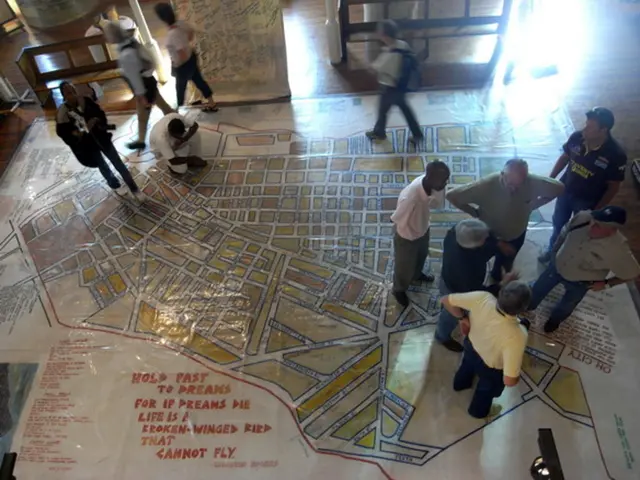Top News Highlights in Data Sphere:
Weekly Data Digest: May 25, 2024 - May 31, 2024
Welcome to this week's rundown of data news headlines. From a revolutionary robot guide for the visually impaired to a deep learning algorithm that could potentially discover new Earth-like planets, buckle up as we dive into this tech-tacular adventure!
**1. Seizure Soldier
Research whizzes at Duke University are working on a machine learning model designed to assist medical professionals in decoding electroencephalography (EEG) charts more accurately. This super soldier can identify seizure-like episodes in unconscious individuals, potentially saving countless lives. The model has been trained using samples from over 2,700 patients, birthing a visual categorization system that's set to revolutionize healthcare.
**2. Code Commander
Paris-based AI company, Mistral AI, has unveiled Codestral, a coding assistant that's been trained on 80 programming languages (yes, you heard that right). From programming functions to filling in partial code, Codestral is a productivity powerhouse, not to mention a pretty nifty error-reducer for developers.
**3. Guide My Way
The University of Glasgow is busy creating RoboGuide, an AI-powered robot dog that'll guide people with visual impairments safely through public spaces. Equipped with advanced sensors and a large language model, this furry friend will not only map environments but also provide interactive guidance - talk about a soulsister (or brother)!
**4. Quantum Leap
Harvard University has partnered with Amazon Web Services to establish Boston's first quantum network for transmitting digital information. The network, running between Boston and Cambridge, is the longest fiber quantum network so far. Prepare for the quantum revolution, folks!
**5. Tick-Off
The Pennsylvania Department of Health has launched a new data dashboard to help residents navigate the seasonal surge in tick bites. This dashboard features interactive data on tickborne disease activity and prevention tips, avoiding the tick-tack of pesky infestations.
**6. Life Story Locker
Autobiographer, a San Francisco startup, has introduced an app that can write biographies for users using their life stories. By capturing, preserving, and sharing users' memories, an AI model will weave cohesive written prose, offering a helping hand (or hand-free, actually) for those writing their own life's book.
**7. Exoplanet Explorer
A group of international researchers have shown how a deep learning algorithm can detect exoplanets (Earth-like planets outside the solar system). This groundbreaking discovery will likely aid in our quest for discovering habitable worlds beyond our own cosmic backyard.
**8. Report Writer Extraordinaire
Perplexity, an AI search platform, has launched Pages - a tool that generates written reports based on user prompts. Simply input a topic or question, and Pages' AI model scans the Internet for relevant information, organizes it, and turns it into a cohesive report - making your research process a whole lot easier (and better).
**9. Digital Haven
Indonesia's government has introduced INA Digital, a centralized digital platform for citizens to access various government services. From obtaining driver's licenses to health services, this app might just make your life a whole lot easier and more streamlined.
**10. Ultra-Sleuth
Researchers at the University of Cambridge have designed ultra-fine sensors, 50 times thinner than a human hair. These sensors can monitor human health and environmental changes without being noticed, opening a new chapter in the world of healthcare and analysis.
This week's roundup showcases the incredible advancements in AI technology and its potential to transform various aspects of our lives - from health to productivity. Stay tuned for more exciting developments!
Enrichment Data:
Recent developments in AI technology for diagnosing seizures and enhancing the accuracy of seizure-like event diagnoses include several notable advancements:
- 2HELPS2B Tool for Seizure Prediction: Researchers are using the 2HELPS2B tool, an AI-based scorecard, to predict seizures in hospitals. Its simplicity and wide adoption in ICUs make it an efficient tool for resource allocation without compromising predictive accuracy.
- AI for Non-Convulsive Seizures: Abrazo Arrowhead doctors are utilizing AI to rapidly detect non-convulsive seizures, which significantly enhances diagnostic capabilities and saves time.
- Detection of Epilepsy Brain Lesions: An AI tool has been developed that can detect two-thirds of epilepsy brain lesions often missed by doctors, improving diagnostic accuracy.
- Deep Brain Stimulation (DBS) Platform: innovation that uses AI to reduce seizures, improve memory, and address sleep challenges in epilepsy patients.
In addition, AI is proving useful in related neurological conditions such as stroke care and CAR-T cell therapy neurotoxicity assessment.
- The research at Duke University is employing machine learning to create a model that assists medical professionals in deciphering EEG charts more accurately, particularly in identifying seizure-like episodes in unconscious individuals, a potential lifesaver for numerous people. This advancement in AI technology for diagnosing seizures is noteworthy.
- The collaboration between Paris-based AI company Mistral AI and the field of programming has resulted in Codestral, an AI coding assistant trained on 80 programming languages. This tool, designed to aid developers in coding functions and error reduction, is a remarkable integration of artificial intelligence and technology.
- The University of Glasgow is developing RoboGuide, an AI-powered robot dog, to guide people with visual impairments through public spaces. Equipped with advanced sensors and a large language model, RoboGuide not only maps environments but also provides interactive guidance, revolutionizing the assistance for individuals with visual impairments.
- A group of international researchers have demonstrated the ability of a deep learning algorithm to detect exoplanets, potentially aiding in the discovery of Earth-like planets outside our solar system, expanding the scope of science and technology.








